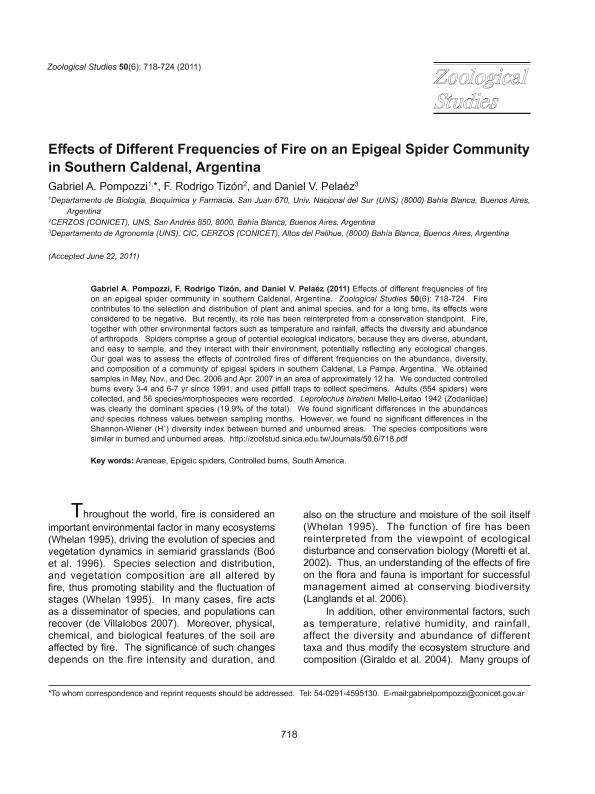Mostrar el registro sencillo del ítem
dc.contributor.author
Pompozzi, Gabriel Alejandro

dc.contributor.author
Tizón, Francisco Rodrigo

dc.contributor.author
Pelaez, Daniel Valerio

dc.date.available
2017-07-31T16:10:15Z
dc.date.issued
2011-11
dc.identifier.citation
Pompozzi, Gabriel Alejandro; Tizón, Francisco Rodrigo; Pelaez, Daniel Valerio; Effects of different frequencies of fire on an epigeal spider community in southern Caldenal, Argentina; Academia Sinica; Zoological Studies; 50; 6; 11-2011; 718-724
dc.identifier.issn
1021-5506
dc.identifier.uri
http://hdl.handle.net/11336/21626
dc.description.abstract
Fire contributes to the selection and distribution of plant and animal species, and for a long time, its effects were considered to be negative. But recently, its role has been reinterpreted from a conservation standpoint. Fire, together with other environmental factors such as temperature and rainfall, affects the diversity and abundance of arthropods. Spiders comprise a group of potential ecological indicators, because they are diverse, abundant, and easy to sample, and they interact with their environment, potentially reflecting any ecological changes. Our goal was to assess the effects of controlled fires of different frequencies on the abundance, diversity, and composition of a community of epigeal spiders in southern Caldenal, La Pampa, Argentina. We obtained samples in May, Nov., and Dec. 2006 and Apr. 2007 in an area of approximately 12 ha. We conducted controlled burns every 3-4 and 6-7 yr since 1991, and used pitfall traps to collect specimens. Adults (554 spiders) were collected, and 56 species/morphospecies were recorded. Leprolochus birabeni Mello-Leitao 1942 (Zodariidae) was clearly the dominant species (19.9% of the total). We found significant differences in the abundances and species richness values between sampling months. However, we found no significant differences in the Shannon-Wiener (H´) diversity index between burned and unburned areas. The species compositions were similar in burned and unburned areas.
dc.format
application/pdf
dc.language.iso
eng
dc.publisher
Academia Sinica

dc.rights
info:eu-repo/semantics/openAccess
dc.rights.uri
https://creativecommons.org/licenses/by-nc-sa/2.5/ar/
dc.subject
Araneae
dc.subject
Epigeic Spiders
dc.subject
Controlled Burns
dc.subject
South America
dc.subject.classification
Zoología, Ornitología, Entomología, Etología

dc.subject.classification
Ciencias Biológicas

dc.subject.classification
CIENCIAS NATURALES Y EXACTAS

dc.title
Effects of different frequencies of fire on an epigeal spider community in southern Caldenal, Argentina
dc.type
info:eu-repo/semantics/article
dc.type
info:ar-repo/semantics/artículo
dc.type
info:eu-repo/semantics/publishedVersion
dc.date.updated
2017-05-02T18:59:00Z
dc.identifier.eissn
1810-522X
dc.journal.volume
50
dc.journal.number
6
dc.journal.pagination
718-724
dc.journal.pais
China

dc.description.fil
Fil: Pompozzi, Gabriel Alejandro. Universidad Nacional del Sur. Departamento de Biología, Bioquímica y Farmacia; Argentina. Consejo Nacional de Investigaciones Científicas y Técnicas; Argentina
dc.description.fil
Fil: Tizón, Francisco Rodrigo. Consejo Nacional de Investigaciones Científicas y Técnicas. Centro Científico Tecnológico Conicet - Bahía Blanca. Centro de Recursos Naturales Renovables de la Zona Semiárida. Universidad Nacional del Sur. Centro de Recursos Naturales Renovables de la Zona Semiárida; Argentina
dc.description.fil
Fil: Pelaez, Daniel Valerio. Provincia de Buenos Aires. Gobernación. Comisión de Investigaciones Científicas; Argentina. Consejo Nacional de Investigaciones Científicas y Técnicas. Centro Científico Tecnológico Conicet - Bahía Blanca. Centro de Recursos Naturales Renovables de la Zona Semiárida. Universidad Nacional del Sur. Centro de Recursos Naturales Renovables de la Zona Semiárida; Argentina. Universidad Nacional del Sur. Departamento de Agronomía; Argentina
dc.journal.title
Zoological Studies

dc.relation.alternativeid
info:eu-repo/semantics/altIdentifier/url/http://zoolstud.sinica.edu.tw/506.htm
Archivos asociados
